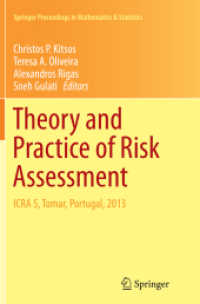- ホーム
- > 洋書
- > 英文書
- > Cinema / Film
Full Description
This book is a study of Grigory Kozintsev's two cinematic Shakespeare adaptations, Hamlet (Gamlet, 1964), and King Lear (Korol Lir, 1970). The films are considered in relation to the historical, artistic and cultural contexts in which they appear, and in relation to the contributions of Dmitri Shostakovich, who wrote the films' scores; and Boris Pasternak, whose translations Kozintsev used. The films are analyzed respective to their place in the translation and performance history of Hamlet and King Lear from their first appearances in Tsarist Russian arts and letters. In particular, this study is concerned with the ways in which these plays have been used as a means to critique the government and the country's problems in an age in which official censorship was commonplace. Kozintsev's films (as well as his theatrical productions of Hamlet and Lear) continue along this trajectory of protest by providing a vehicle for him and his collaborators to address the oppression, violence and corruption of Soviet society. It was just this sort of covert political protest that finally effected the dissolution and fall of the USSR.
Contents
Table of Contents
Acknowledgments viii
Preface
Introduction
1. Kozintsev's Contexts 1: Hamlet in Russia in the 18th and 19th Centuries
2. Kozintsev's Contexts 2: Soviet Hamlets from the Revolution until after Stalin's Death
3. Hamlet in the "Thaw" and Kozintsev's 1964 Film Adaptation
4. Kozintsev's Contexts 3: Russian and Soviet King Lears from the 18th Century through World War II
5. King Lear Revisited in the Brezhnev Era: Kozintsev's 1970 Film Adaptation
Epilogue
Chapter Notes
Bibliography
Index






